2013年中考英语 语法知识盘点 第8讲 动词的分类课件
文档属性
| 名称 | 2013年中考英语 语法知识盘点 第8讲 动词的分类课件 |
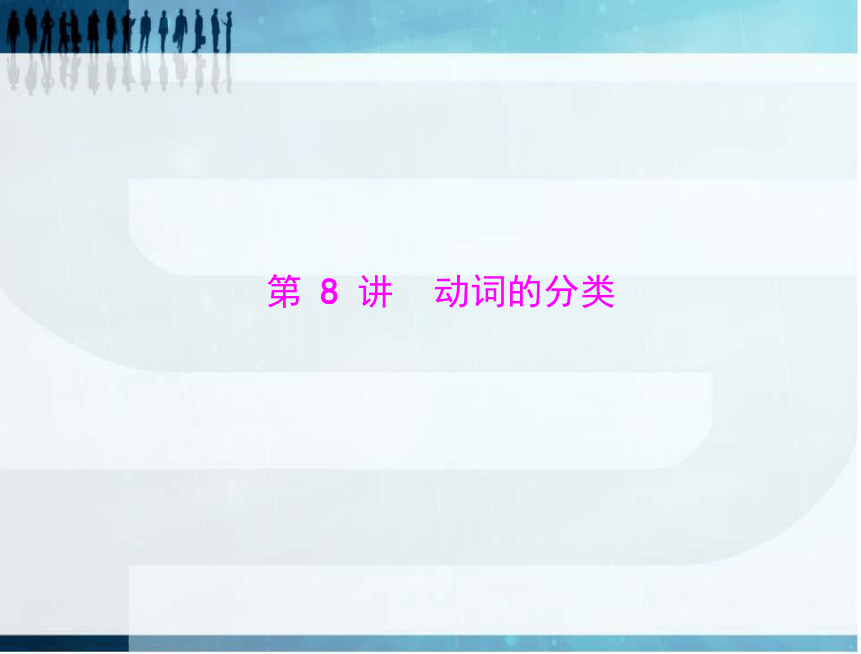
|
|
| 格式 | zip | ||
| 文件大小 | 210.4KB | ||
| 资源类型 | 教案 | ||
| 版本资源 | 通用版 | ||
| 科目 | 英语 | ||
| 更新时间 | 2013-01-03 00:00:00 | ||
图片预览

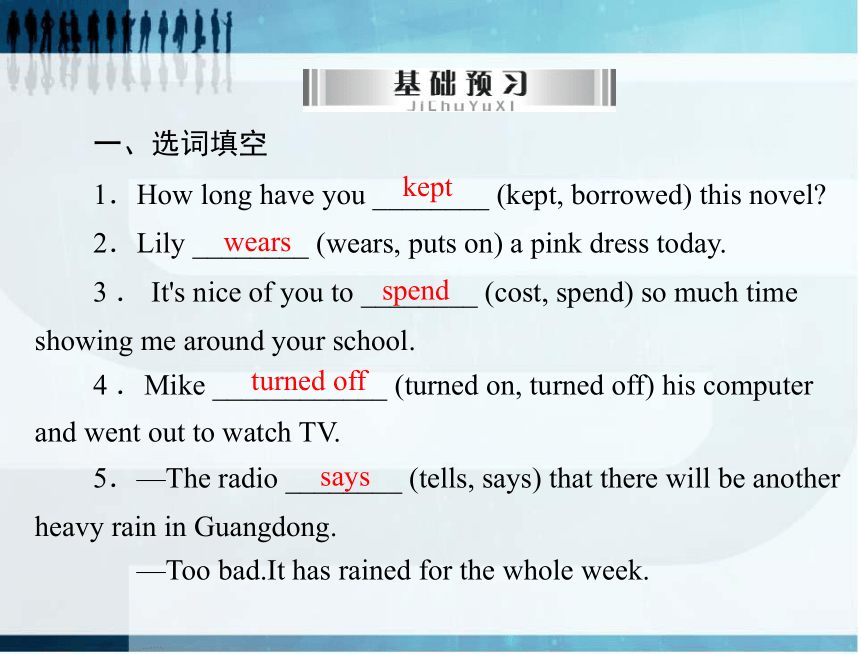
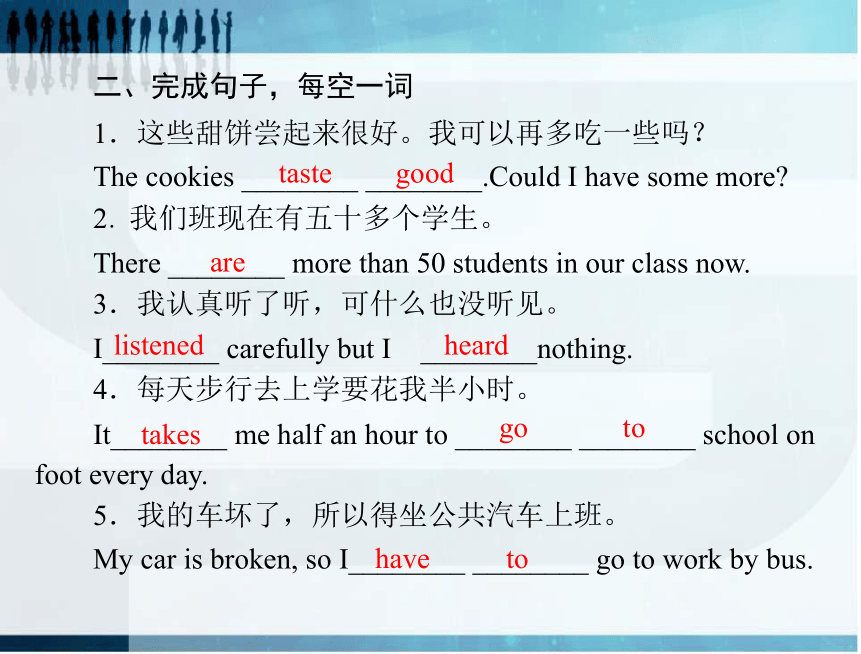
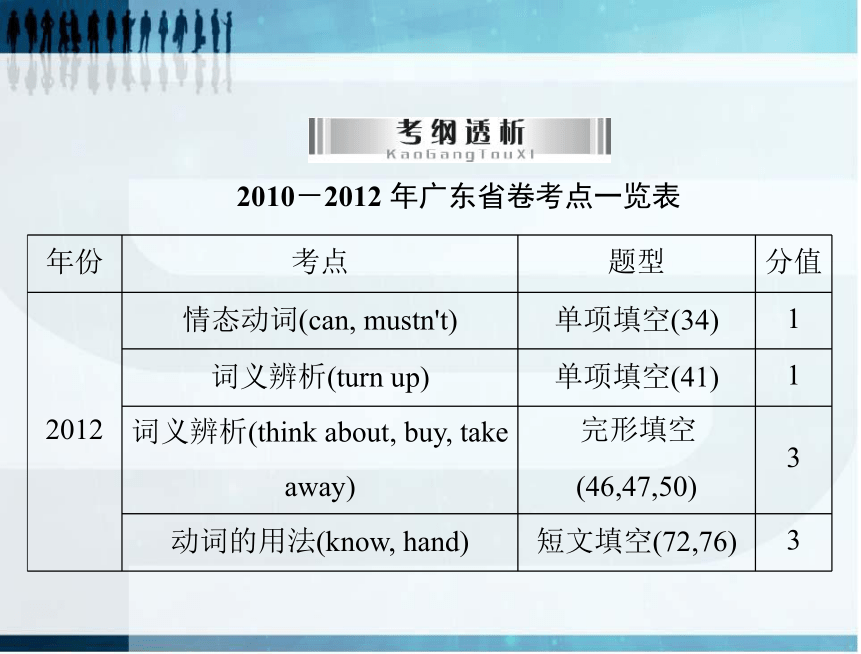
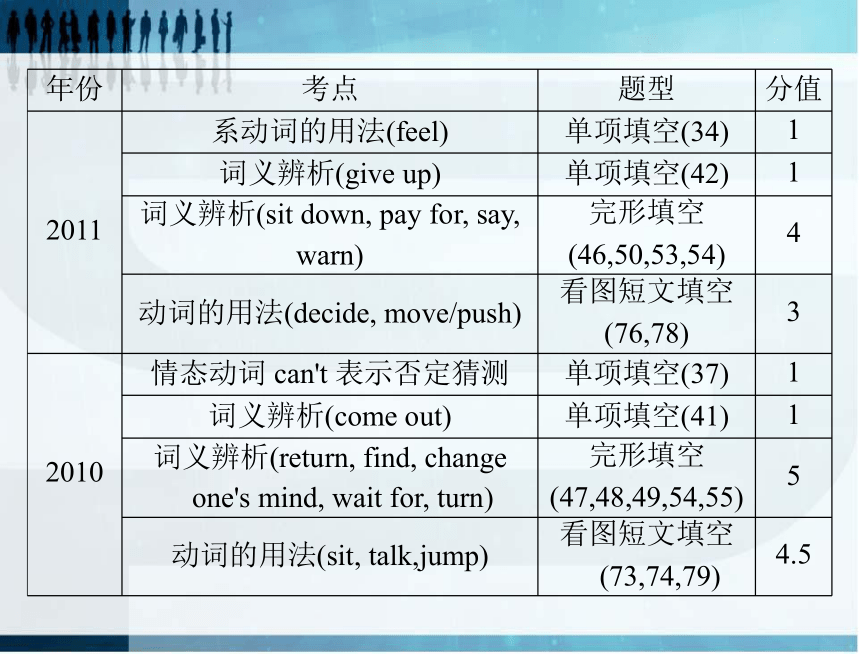
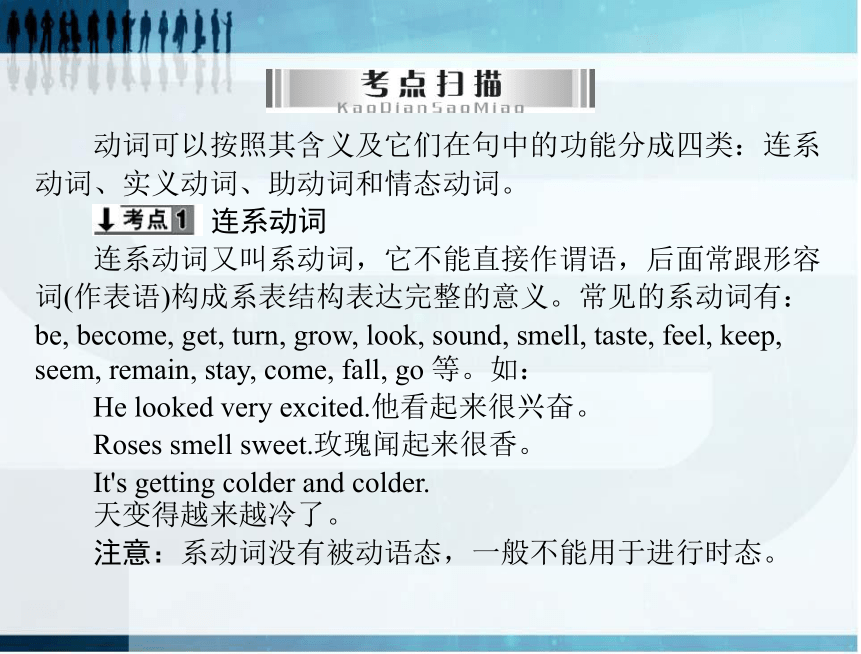
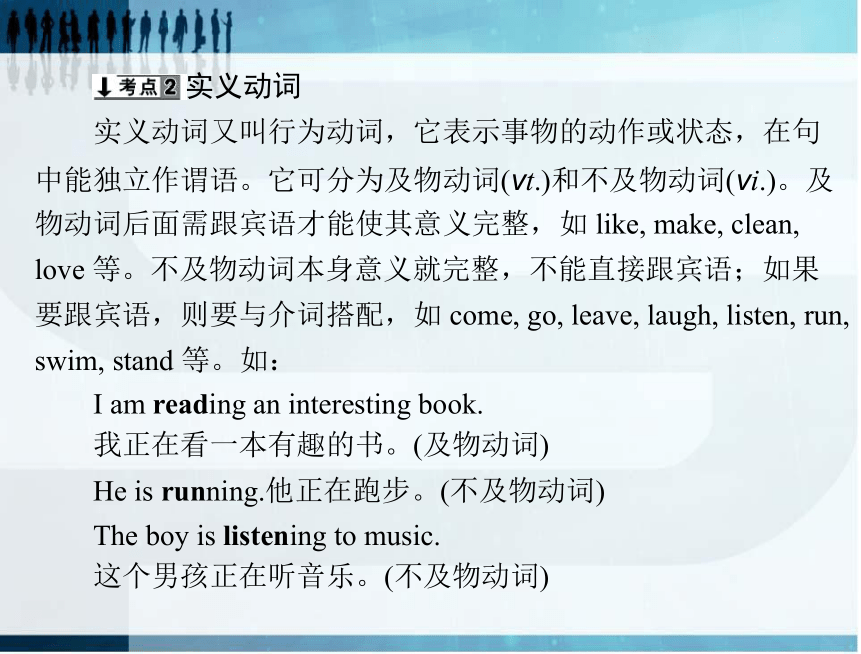
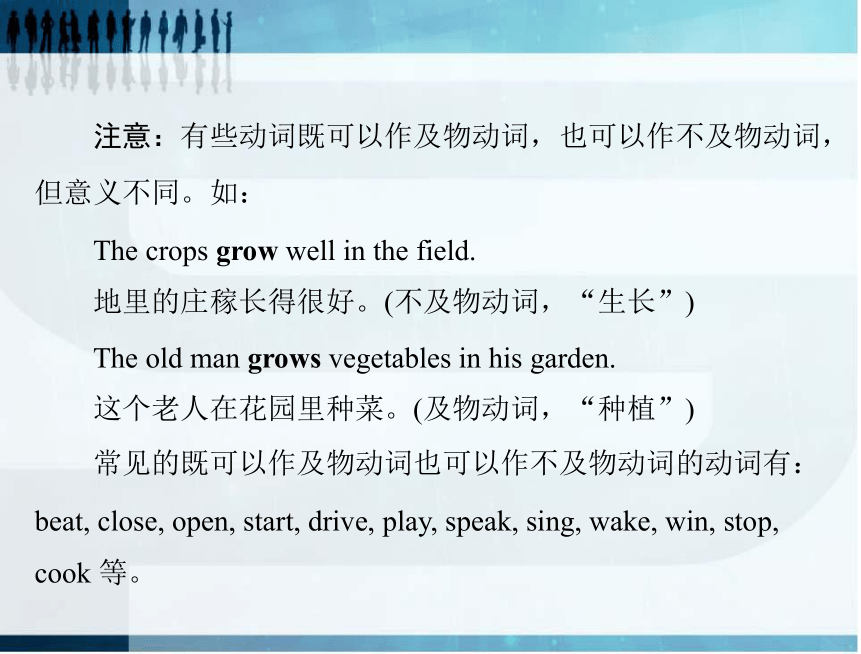
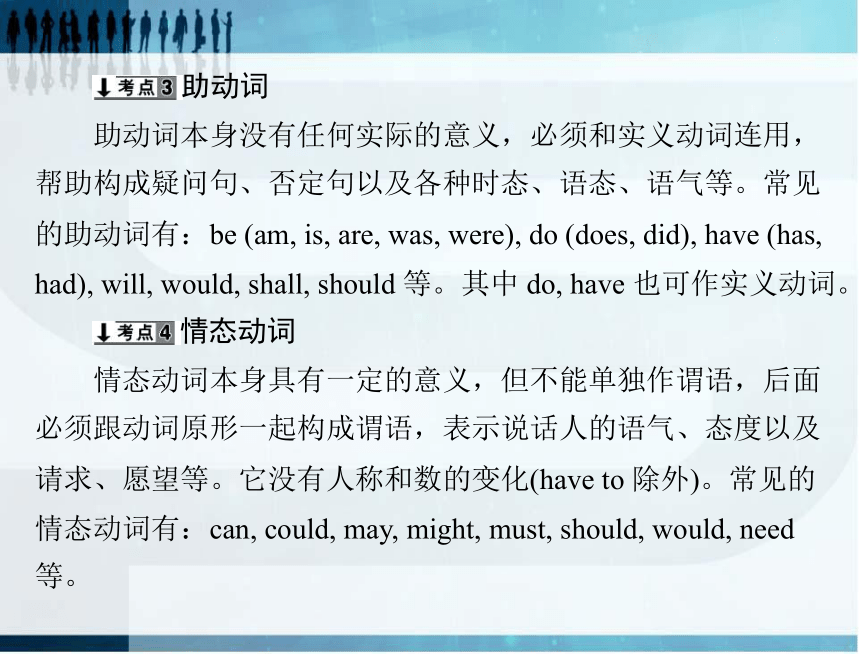
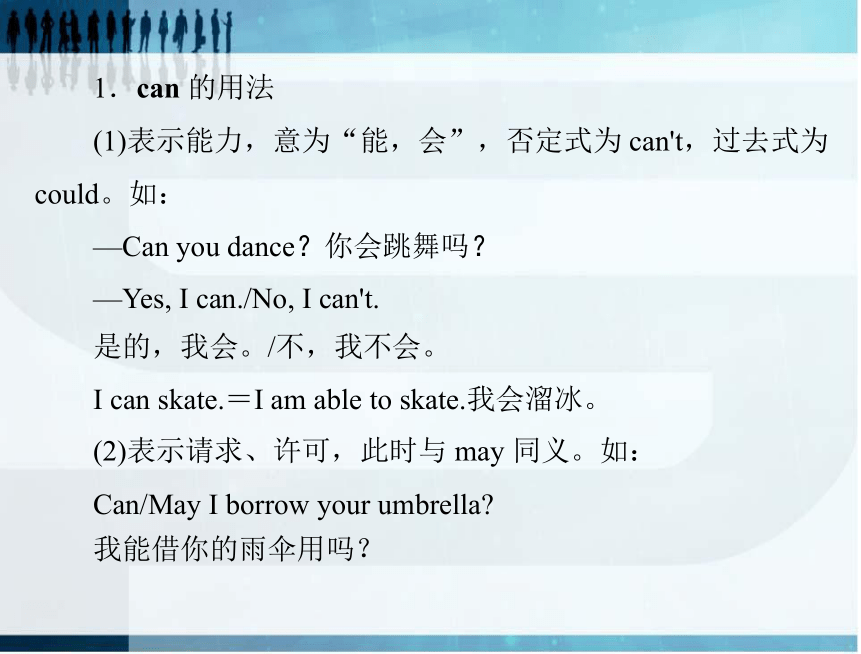
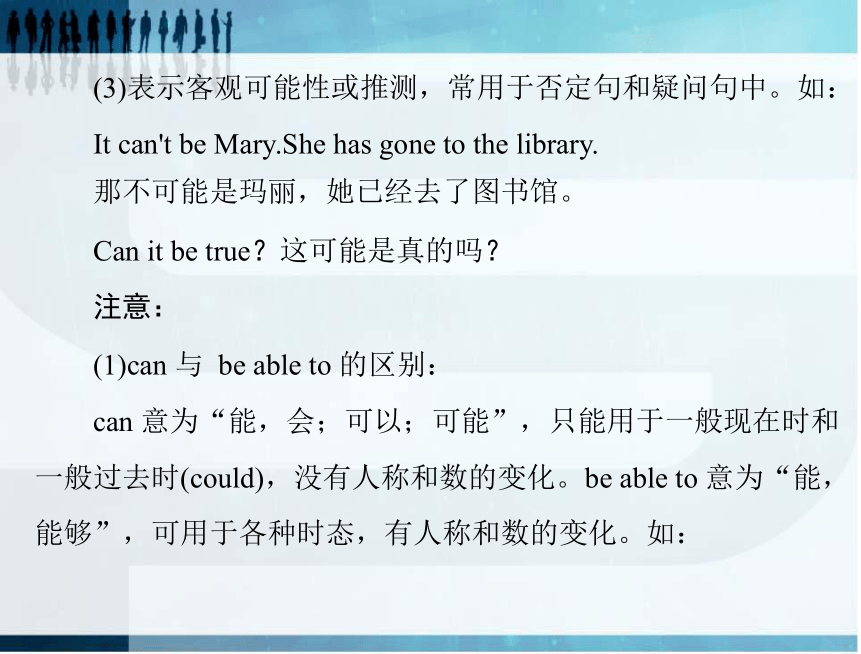
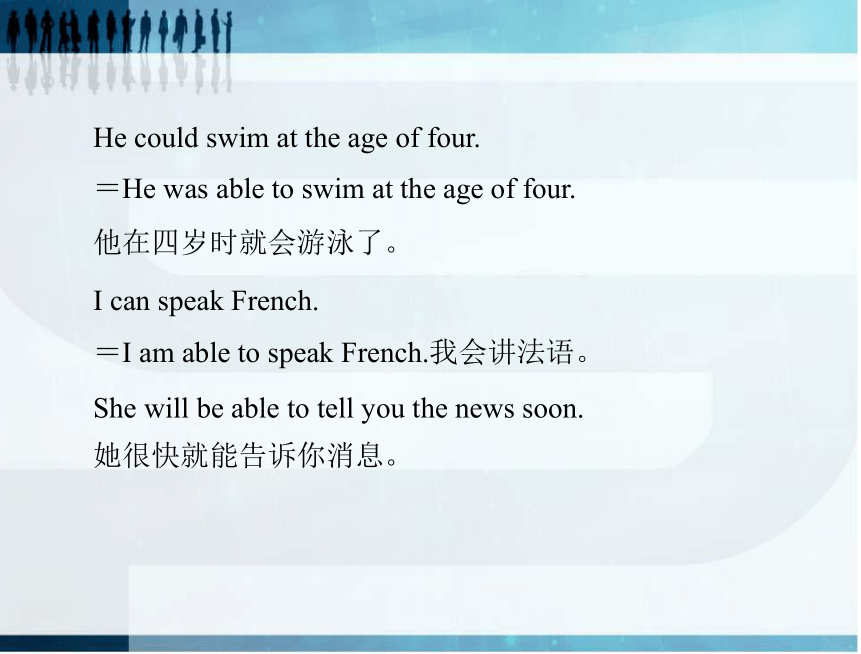
文档简介
课件69张PPT。第 8 讲动词的分类一、选词填空keptwears1.How long have you ________ (kept, borrowed) this novel?
2.Lily ________ (wears, puts on) a pink dress today.
3 . It's nice of you to ________ (cost, spend) so much timeshowing me around your school.spendturned off 4 .Mike ____________ (turned on, turned off) his computer
and went out to watch TV.
5.—The radio ________ (tells, says) that there will be anotherheavy rain in Guangdong.says—Too bad.It has rained for the whole week.二、完成句子,每空一词tastegood1.这些甜饼尝起来很好。我可以再多吃一些吗?
The cookies ________ ________.Could I have some more?2.我们班现在有五十多个学生。areThere ________ more than 50 students in our class now.3.我认真听了听,可什么也没听见。listenedheardI________ carefully but I________nothing.takes4.每天步行去上学要花我半小时。gotoIt________ me half an hour to ________ ________ school onfoot every day.haveto5.我的车坏了,所以得坐公共汽车上班。
My car is broken, so I________ ________ go to work by bus.2010-2012 年广东省卷考点一览表动词可以按照其含义及它们在句中的功能分成四类:连系动词、实义动词、助动词和情态动词。连系动词 连系动词又叫系动词,它不能直接作谓语,后面常跟形容
词(作表语)构成系表结构表达完整的意义。常见的系动词有:be, become, get, turn, grow, look, sound, smell, taste, feel, keep,seem, remain, stay, come, fall, go 等。如:
He looked very excited.他看起来很兴奋。
Roses smell sweet.玫瑰闻起来很香。It's getting colder and colder.
天变得越来越冷了。注意:系动词没有被动语态,一般不能用于进行时态。实义动词实义动词又叫行为动词,它表示事物的动作或状态,在句中能独立作谓语。它可分为及物动词(vt.)和不及物动词(vi.)。及
物动词后面需跟宾语才能使其意义完整,如 like, make, clean,
love 等。不及物动词本身意义就完整,不能直接跟宾语;如果
要跟宾语,则要与介词搭配,如 come, go, leave, laugh, listen, run,
swim, stand 等。如:I am reading an interesting book.我正在看一本有趣的书。(及物动词)He is running.他正在跑步。(不及物动词)The boy is listening to music.这个男孩正在听音乐。(不及物动词)注意:有些动词既可以作及物动词,也可以作不及物动词,但意义不同。如:The crops grow well in the field.地里的庄稼长得很好。(不及物动词,“生长”)The old man grows vegetables in his garden.这个老人在花园里种菜。(及物动词,“种植”)常见的既可以作及物动词也可以作不及物动词的动词有:beat, close, open, start, drive, play, speak, sing, wake, win, stop,cook 等。助动词 助动词本身没有任何实际的意义,必须和实义动词连用,
帮助构成疑问句、否定句以及各种时态、语态、语气等。常见
的助动词有:be (am, is, are, was, were), do (does, did), have (has,
had), will, would, shall, should 等。其中 do, have 也可作实义动词。情态动词 情态动词本身具有一定的意义,但不能单独作谓语,后面
必须跟动词原形一起构成谓语,表示说话人的语气、态度以及
请求、愿望等。它没有人称和数的变化(have to 除外)。常见的
情态动词有:can, could, may, might, must, should, would, need
等。1.can 的用法(1)表示能力,意为“能,会”,否定式为 can't,过去式为could。如:—Can you dance?你会跳舞吗?—Yes, I can./No, I can't.是的,我会。/不,我不会。I can skate.=I am able to skate.我会溜冰。
(2)表示请求、许可,此时与 may 同义。如:Can/May I borrow your umbrella?
我能借你的雨伞用吗?(3)表示客观可能性或推测,常用于否定句和疑问句中。如:It can't be Mary.She has gone to the library.
那不可能是玛丽,她已经去了图书馆。
Can it be true?这可能是真的吗?
注意:(1)can 与 be able to 的区别: can 意为“能,会;可以;可能”,只能用于一般现在时和
一般过去时(could),没有人称和数的变化。be able to 意为“能,
能够”,可用于各种时态,有人称和数的变化。如:He could swim at the age of four.=He was able to swim at the age of four.
他在四岁时就会游泳了。I can speak French.=I am able to speak French.我会讲法语。She will be able to tell you the news soon.
她很快就能告诉你消息。(2)could 在下列情况时不表示过去时态:①提出委婉的请求时,could 比 can 客气、委婉,但在回答时不可用 could。如:—Could I have a look at the bracelet?
我可以看一看这个手镯吗?—Yes, you can./No, you can't.是的,你可以。/不,不行。②在否定句、疑问句中表示推测或怀疑时,相当于 might,表示“可能,也许”。如:He couldn't be a bad man.他不大可能是坏人。2.may 的用法(1)表示请求、许可,意为“可以,允许”,比 can 正式,常用于肯定句、一般疑问句中。如:May I take a seat here?我可以坐这里吗? 注意:以 May I 开头的一般疑问句的肯定回答用“Yes, you
may.” 或“Yes, please.” 或“Certainly./OK./Sure.” 等;否定回答用
“No, you can't.”或“No, you mustn't (不可以).”或“Please don't.”
等。(2)表示可能性较小或把握性不大的推测,意为“可能,也许”,常用于肯定句,有时也用于否定句。如:He may help you.他也许会帮你。3.must 的用法 (1)表示“必须,应该”,在陈述句中带有有义务、有必要
的主观意愿或命令、要求的语气,在疑问句中则表示询问对方
的意见。否定式 mustn't 表示“禁止,不准,不允许”。如:I must study hard.我必须努力学习。Must I hand in my composition today?
我今天必须交作文吗?You mustn't smoke here.你不准在这儿吸烟。(2)表示非常肯定的猜测,意为“一定,准是”,只用于肯定句。如:The book has John's name on it.It must be his.
这本书有约翰的名字在上面。它肯定是他的。 (3) 以 Must sb. 开 头 的 一 般 疑 问 句 的 肯 定 回 答 用 “Yes,
sb.must.” ; 否定 回答 用 “No, sb.needn't.” 或“No, sb.don't/doesn't
have to.”。如:—Must I finish it today?今天我必须完成这项工作吗?—No, you needn't./No, you don't have to.不,你不必/你没必要。注意:must 与 have to 的区别: (1)两者都可表示“必须”。但 have to 表示客观实际的需
要,有人称和时态变化;must 表示说话人主观上的看法,即主
观思想意识上的必要,无人称和时态变化。如:My bike was broken, so I had to walk to school yesterday.昨天我的自行车坏了,所以不得不走路去上学。(“自行车坏了”是客观情况,所以不得不……)He said he must work hard.他说他必须努力学习。(主观意识中“他认为”必须……)
(2)在否定结构中,don't have to 表示“不必”,mustn't 表示“禁止,不准”。4.need 的用法 need 意为“需要”,既可作情态动词,也可作实义动词。
作情态动词时多用于疑问句和否定句中,否定式为 needn't,表
示“不必”。作实义动词时,后接 to do 或名词,即:need/don't
need to do sth., need sth.;当主语是物时,用 need doing 表示被
动的含义,相当于 need to be done。 如:Need I go there?我需要去那里吗?I don't need to buy a new backpack.(作实义动词)
=I needn't buy a new backpack.(作情态动词)
我不必买新书包。The trees need watering.(主动形式表被动)=The trees need to be watered.这些树需要浇水。5.should 的用法should 意为“应该”,表示义务、责任,可用于各种人称。否定式为 shouldn't。如:You shouldn't give it up.You should try your best.
你不应该放弃,你应该竭尽全力。
6.had better 的用法had better 意为“最好”,否定式为 had better not,表示劝告、忠告,后接动词原形。如:You'd better not play soccer near the road.
你最好不要在公路边踢球。We had better let him go.我们最好让他走吧。短语动词常见的短语动词的构成方式有以下几种:
1.动词+介词。如: hear of 听说, think of/about 思考, talk to/with 和……交
谈, talk about/of 谈论, worry about 担心, speak to 与……通
话, get to 到达, arrive in/at 到达, look at 看一看, look after
照顾, look for 寻找, look like 看起来像, listen to 听(某人或
某物), hear from 收到……的来信,wait for 等候,ask for 要求。2.动词+副词。如: dress up 打扮, eat up 吃完, give up 放弃, put up 建造,
pick up 捡起, ring up 打电话, send up 发射, take away 拿走,
send away 派遣,move away 搬走,take down 拿下,write down
记下, put down 放下, turn up 调大(音量等), turn down 关小,
find out 发现,sell out 卖完,try out 试验,take out 取出,wear
out 穿破, try on 试穿, put on 穿上, turn on 打开, turn off
关上,take off 脱下,give back 归还,get back 取回,look over
检查, think over 仔细思考。 注意:这类短语动词在接宾格代词作宾语时,必须将其放
在动词和副词之间。如:take it away, put them down, turn it off,
try them on 等。3.动词+副词+介词。如:look forward to 期待, stay away from 远离。 1.arrive, get to, reach
这三个词都有“到达”之意。
(1)arrive 和 get 是不及物动词,后面需加介词才能接地点。
其中 arrive at+小地方, arrive in+大地方, get to+地点。
(2)reach 是及物动词,后面直接加地点。即景活用toinat/(1)I got ________ the village last month.
(2)We'll arrive ________ Shanghai tomorrow morning.
(3)When did you arrive ________ the station?
(4)Please call me when you reach ________ Changsha. 2.take, bring, fetch, get
(1)take 指从说话者所在的地方把某人( 物)“带去”( 单
程)。
(2)bring 指从别处把某人(物)带来说话者所在的地方(单
程)。
(3)fetch=get,指从某地到别处把某物拿来(双程)。即景活用bringtakefetch/get (1)Next time don't forget to __________ me a copy of your
work.
(2)He likes these art works in this town very much, so he
wants to ________ them to his country when he leaves.
(3)Please ______________ me the documents in that room.3.join, join in, attend, take part in(1)join 指参加某党派、某组织或某社会团体并成为其中的一员,如参军、入党、入团等。(2)join in 指参加小规模的活动,如球赛、游戏等,多用于口语中。 (3)attend 是正式用语,指出席或参加会议、仪式,如婚礼、
葬礼、上课、上学、听报告等,强调的是“出席”这一动作本
身。(4)take part in 指参加群众性的活动,重在说明主语参加这一活动并在活动中发挥积极作用。take part injoinedjoined inattend 即景活用
(1)Every excellent player wants to ______________ the
Olympics and win.
(2)His brother ________ the army three years ago.
(3)The whole class ______________ to sing the song soon.
(4)I will ________ an important meeting tomorrow.4.tell, say, speak, talk (1)tell 意为“告诉;讲述”,表示告诉某人某事,着重指
把一件事情传达给别人,或讲述一个事件、一个故事等,可接
双宾语。 (2)say 意为“说;诉说”,指用言语表达自己的思想,后
接说的内容,常作及物动词,后接名词、代词或从句。
(3)speak 意为“说;说话 ”,用作不及物动 词时强调
“说”这一动作,而不是指说的内容;作及物动词时通常接某
种语言作宾语。 (4)talk 是不及物动词,意为“谈话”,指两人或两人以上
的一般交谈,常与介词 to, with 连用,意为“与……交谈”;与
about, of 连用时意为“谈论”。即景活用speaktosayin(1)请找李雷听电话,好吗?toldnottolieMay I ________ ________ Li Lei, please?
(2)你能用英语说这个单词吗?
Can you ________ the word ________ English?
(3)妈妈告诉我不要躺在床上看书。
Mum ________ me ________ ________ ________ in bed toread.talkingwith/to(4)李先生正与布朗太太在交谈。
Mr.Li is ________ ___________ Mrs.Brown.5.pay, spend, cost, take (1)pay 意为“付款;赔偿”,主语通常是人,常用结构为:
sb.pay some money for sth.或 pay sb.(some money for sth.)。
(2)spend 的 主 语 通 常 是 人 , 常 用 结 构 为 : (sb.) spend
money/time on sth.或(sb.) spend money/time (in) doing sth.。
(3)cost 的主语必须是物,常用结构为:sth.cost (sb.) somemoney。 (4)take 表示“占用、花费”时间,其主语通常为形式主
语 it 或物,常用结构为:It/sth.takes sb.some time to do sth.。spentpaytookcost即景活用
(1)They ________ two years building the bridge.
(2)How much money did you ________ for the jacket?
(3)It ________ him three hours to finish his homework.
(4)The car ________ me lots of money.6.borrow, lend, keep (1)borrow 表示从别人那里借来东西,即“借进来”。常
用的搭配是 borrow sth.from sb.。borrow 是一个瞬间完成的动作,
因此不能与一段时间连用。 (2)lend 表示把自己的东西借给别人,即“借出去”。常
用的搭配是 lend sb.sth./lend sth.to sb.。lend 与 borrow 一样,也
是一个瞬间完成的动作,不能与一段时间连用。 (3)keep 也可意为“借”,但侧重指借来后的保存或使用
阶段,表示借用一段时间,因此可以与一段时间连用。borrowfromlendingmelendingto 即景活用
(1)我们经常从学校图书馆借书。
We often ________ books ________ our school library.
(2)谢谢你把自行车借给我。
Thank you for ________ ________ your bike. =Thank you
for ________ your bike ________ me.(3)这本书我才借了一星期。havekeptI ________ ________ this book for only one week.7.dress, wear, put on, be in(1)dress 意为“给……穿衣”,只用于穿衣服,不用于穿鞋、戴帽子等,宾语为人。(2)wear 表示“穿、戴”衣物、鞋、帽、饰物等,强调“穿着”的状态。(3)put on 意为“把……穿上”,强调“穿”的动作。
(4)be in 表示“穿着,戴着”,后接颜色或衣物,强调状态。dressinwearingput on即景活用
(1)Please ____________ the children right now.
(2)John is ____________ white today.
(3)The girl is ___________ a pair of glasses.
(4)It's cold.You'd better ___________ your coat.8.happen 与 take place两者均可意为“发生”,都是不及物动词,不能用于进行时态和被动语态。 (1)happen 常指具体事件的发生,特别是那些偶然的或未
能预见的“发生”,此时主语为“事”;还可表示“碰巧;恰
好”之意,此时主语为“人”。(2)take place 通常指“(某事)按计划进行或发生”,还可表示“举行某种活动”。happenstaking placehappened即景活用
(1)He __________ to know the place.
(2)Great changes are ______________ in the city.
(3)Has anything ____________ to him?
(4)The meeting will ____________ next Friday.
take place9.look, see, watch, read(1)look 强调“看”的动作,是不及物动词,后接宾语时要加介词 at。 (2)see 强调“看”的结果,意为“看见”,是及物动词,
可用于短语 see sb.do/doing sth.(看见某人做过/正在做某事)。(3)watch 意为“观看,注视”,强调过程,常用于看电视、球赛等。(4)read 意为“读,阅读”,指看书、看报等。sawlookwatchingreading 即景活用
(1)I ________ a bird in the tree just now.
(2)The teacher told us to ________ at the blackboard.
(3)All the students are ____________the football match
carefully.
(4)Li Lei is ____________ the letter from his parents.()1.(2012 年广东)I love this song by Lady Gaga. Wouldyou ________ the TV a bit, please? I can't hear it clearly.A.turn on
C.turn upB.turn off
D.turn down C 题意:我很喜欢 Lady Gaga 唱的这首歌。你能把电视
声音调大一点吗?我听不清楚。turn on 打开;turn off 关掉;turn
up 调大音量;turn down 调小音量。故选 C。( )2.(2012 年广东)—________ I swim here?
—I'm sorry.Children ________ swim alone here.A.Must; can't
C.Can; mustn'tB.May; must
D.Can't; canC题意:“我能在这里游泳吗?”“对不起,小孩子不准独自在这儿游泳。”can 能够;may 能够,可以;must 必
须;can't 不能;mustn't 禁止。故选 C。()3.(2012 年广东广州)Although you may meet somedifficulties, you should never ________.
A.turn up
B.get up
C.give up
D.grow up
C 题意:虽然你会遇到一些困难,但你应永不放弃。turn
up 调大音量;get up 起床;give up 放弃;grow up 长大。故选 C。()4.(2012 年广东广州)You ________ be hungry after thelong walk.Help yourself to some cakes. A.can't
C.needB.shouldn't
D.must D 题意:走了很长的路之后,你肯定饿了。吃些蛋糕吧。
can't 不能,不可能;shouldn't 不应该;need 需要;must 必须,
一定。故选 D。()5.(2012 年广东佛山)You ________ come latetomorrow.The plane waits for nobody.
A.can't
B.needn't
C.mustA题意:明天你不能迟到。飞机不会等人。can't 不能;needn't 不必;must 必须。故选 A。()6.(2012 年广东梅州)Her son ________ Coke, but nowhe ________ milk.
A.used to drink; is used to drinking
B.used to drinking; drinks
C.is used to drinking; used to drink
D.is used to drink; is drinking
A 题意:她的儿子过去常常喝可乐,但现在习惯了喝牛
奶。used to do sth.过去常常做某事;be used to doing sth.习惯于
做某事。()7.(2012 年广东梅州)He ________ his classmates.A.get along well with
C.is getting along well withB.get well with
D.is get well with C get along well with 与……相处得好,且主语是第三人称
单数,故选 C。()8.(2012 年广东梅州)Every year I ________ the gardencompetition too, and I always win a little prize for the worst garden
in the town!A.enter
C.entered for B.entered
D.enter for D enter 参加(侧重于参加考试),enter for 参加(侧重于参加
竞赛、活动),且是描述一般状态,故选 D。()9.(2012 年广东梅州)Captain Alison will ________ ateight o'clock, so we shall have plenty of time.A.beginning
C.be set out B.set out
D.be begun B 题意:Alison 船长将在 8 点钟出发,因此我们应该有充
足的时间。begin 开始,set out 出发,故选 B。()10.(2012 年广东梅州)I enjoy playing computer games,but I can't ________ too much time ________ that.A.take; doingB.spend; doingC.spend; for doingD.take; to doB表示“花多少时间做某事”可用“sb.spend +时间+(in) doing sth.”或“sth./it takes sb.+时间+to do sth.”。()11.(2012 年广东茂名)As classmates, we ________show our love to her.
A.should
B.has to
C.have
A 题意:作为同班同学,我们应该对她表示关心。should
表示“应该”,have to 表示客观上“不得不”。()12.(2012 年广东湛江)—Is Jane playing the violin inthat room?
—It ________ be her.She has gone to Chicago.A.can
C.shouldn'tB.must
D.can't D 题意:“在那个房间拉小提琴的是 Jane 吗?”“不可
能是她。她已经去了芝加哥。”根据题意可知表示否定的推测。
can't be 不可能是,用于有把握的否定推测。()13.(2012 年广东深圳)—It's said a pianist will performat Poly Theater on Friday evening.Is it Lang Lang?
—Yes, it ________ him.He ________ for a week.
A.must be; has arrived here
B.maybe; has been here
C.must be; has been here
D.maybe; has arrived hereC表示“在某地待了一段时间”用 has been in,且根据“已在这儿待了一周”可知是表示比较有把握的肯定推测,故
用 must be。()14.(2012 年广东河源)________, Tom! It's time to getup and go to school. A.Wake up
C.Grow upB.Make up
D.Look up A 题意:醒醒,Tom!是时间起床去上学了!wake up 醒
来;make up 编造;grow up 长大;look up 查找。故选 A。()15.(2011 年广东)This silk dress ________ sosmooth.It's made in China.A.feelsB.smellsC.soundsD.Tastes A 题意:这条丝绸做的连衣裙摸起来非常光滑。它产自
中国。feel 感觉,摸起来;smell 闻起来;sound 听起来;taste
尝起来。根据题意可知选 A。()16.(2011 年广东)Smoking is bad for your health.You'dbetter ________. A.set it up
C.pick it upB.give it up
D.look it upB 题意:吸烟对你的健康有害。你最好戒掉它。give up 放弃。()17.(2011 年广东广州)May I have a rest? I have alreadyfinished ________ the report. A.write
C.to writeB.writing
D.WrittenB finish doing sth.完成做某事。()18.(2011 年广东广州)—Excuse me, can I smoke here? —No, ________.
A.you must
B.you'd not better
C.you can
D.you'd better not
D 根据答语中的“No”可知回答的这个人“不允许”在此
吸烟,故用否定式;had better 的否定式是在后面直接加 not。()19.(2011 年广东深圳)—Must I return the book thisweek?
—No, you ________.You can ________ it for 20 days.
A.mustn't; keep
B.needn't; borrow
C.needn't; keep
D.mustn't; borrow
C must 引导的一般疑问句的否定回答用 needn't;由 for 20
days 可知谓语动词要用延续性动词,故用 keep。()20.(2011 年广东茂名)The old parents ________ a greatdeal of their savings on their son's new house.A.costB.spentC.paidB三个词都表示“花费”,但只有 spend 可用于搭配:sb.spend some time/money on sth.,故选 B。()21.(2011 年广东茂名)—May I do the homeworktomorrow?
—No, you ________.You should hand it in before class
tomorrow.A.mustn'tB.needn'tC.couldn'tA以 May I 开头的一 般疑问句的否定回 答用“No, youcan't.”或“No, you mustn't.”或“Please don't.”。()22.(2011 年广东肇庆)—What is the name of the songyou sing just now? It ________ beautiful.
—It is You and Me.
A. heard
B.listened
C.sounded
C 三个选项中只有 sound 可作系动词,后接形容词构成
系表结构。sound 听起来。()23.(2011 年广东清远)If you meet some new words,you can ________ in a dictionary.A.look it up
C.look them upB.look up it
D.look up them C 题意:当你遇到新单词时,可以查字典。words 为复数,
故用 them 指代;动副词短语接代词作宾语时,宾语应放在动词
和副词的中间。故选 C。()24.(2011 年广东清远)I want to watch the basketballmatch.Would you please ________ the TV? A.turn on
C.turn downB.turn off
D.turn up A 题意:我想看篮球比赛,你能打开电视吗?turn on 打
开(电器等)。()25.(2011 年广东梅州 )He ________ all his money________ to charity after he died.A.gave; up
C.gave; away B.gave; in
D.gave; outCgive up 放弃;give in 屈服;give away 赠送;give out分发。根据题意可知选 C。()26.(2011 年广东河源)—________ I watch TV now,Mom?
—No.It's too late, and you ________ go to bed. A.May; have to
C.Can; will B.Will; should
D.Must; needA题意:“妈妈,我现在可以看电视吗?”“不行,太晚了。你得睡觉了。”may 可以;have to 不得不,应该。()27.(2011 年广东佛山)You ________ worry aboutme.I'm fine.A.can'tB.mustn'tC.needn'tC 题意:你不用担心我,我很好。needn't 不需要。()28.(2010 年广东)Zhang Liangying's new CD will________ next month.
A. come along
B.come up
C.come over
D.come out
D 题意:张靓颖的新专辑将在下个月发行。come along 出
现,一起来;come up 发生,走近,上升;come over 过来,顺
便拜访;come out 出现,出版,发行。根据题意可知选 D。()29.(2010 年广东)—I saw Kevin in the supermarket thismorning.
—No, it ________ him.He moved to Canada last week.
A. can be
B.must be
C.can't be
D.mustn't be
C 题意:“我今天早上在超市见到 Kevin 了。”“不,那
肯定不是他。他上周搬去加拿大了。”由答语的后半部分可知
前面是对上句的否定推测,故用 can't; must 只用于肯定推测。( )30.(2010 年广东湛江)—Must I finish my work now?
—No, you ________ do it tomorrow.
A. can
B.have to
C.need
D.mustA题意:“我必须现在完成我的工作吗?”“不,你可以明天再做。”can 可以;have to 不得不;need 需要;must 必
须。根据题意可知选 A。()31.(2010 年广东深圳)—Is Mr.Smith in his office now? —No, he ________ there.I ________ him in the library a
moment ago.
A. may be; saw
B.can't be; see
C.mustn't be; see
D.can't be; sawD题意:“史密斯先生现在在办公室吗?”“他不可能在,我刚才看见他在图书馆。”can't 表示否定猜测,意为“不
可能”;a moment ago 是表示过去的时间状语,故用 saw。()32.(2010 年广东深圳)—Mary, would you like tothis game?
—I'd love to, but I have to finish ________ the composition
first.
A.join in; to write
B.attend; writing
C.join; to write
D.take part in; writing
D 表示“参加比赛”可用 take part in/join in, finish 后接动
名词作宾语。故选 D。()33.(2010 年广东茂名)—Excuse me, sir! Can I finishmy homework tomorrow morning?
—Oh, no.It ________ be finished tonight.
A.would
B.should
C.couldB题意 :“抱 歉 ,先生 , 我可以明天上午完成作业吗?”“噢,不行。你应该今天晚上完成。”would 将要;should
应该;could 可以。故选 B。()34.(2010 年广东茂名)Don't forget ________ “Thankyou”, when others have helped you.
A.to say
B.to speak
C.to tellA当表示“说”时,say 后面可直接接说的内容,speak后只能接某种语言,而 tell 常用于结构 tell sb.sth./tell sth.to sb.。
故选 A。()35.(2010 年广东梅州)—How much did you ________the dictionary?
—12 yuan.
A.buy
B.spend
C.cost
D.pay forD表示“某物花费某人多少钱”可用 sb.spend money onsth./sth.cost sb.money/sb.pay money for sth.,故选 D。()36.(2010 年广东梅州)If I were you, I would ________electricity.It is dangerous. A.stay away
C.stay away fromB.keep far from
D.keep from C 题意:如果我是你,我就会远离电。那很危险。stay away
外出,远离(相当于不及物动词);keep away from 远离;没有 keep
far from 的搭配;stay away from 不接近,离……远点;keep from
防止。故选 C。()37.(2010 年广东广州)You should really ________smoking.It's a terrible habit.
A.grow up
B.pick up
C.give up
D.set up
C 题意:你真的应该戒烟了。吸烟是一个坏习惯。grow up
成长;pick up 捡起;give up 放弃;set up 建立。故选 C。()38.(2010 年广东广州)It doesn't look like rain, so you________ bring your umbrella with you. A.shouldn't
C.can'tB.mustn't
D.needn't D 题意:看起来不像有雨,所以你不必带伞。shouldn't 不应
该;mustn't 禁止;can't 不能,不可能;needn't 不必。故选 D。()39.(2010 年广东佛山)She ________ go to thesupermarket far from her home—nowhere else is good enough for
her.A.mustB.has toC.Can B 由后半句“nowhere else is good enough for her”可知表示
的是客观上的“不得不”,故用 has to。谢谢合作 再见
2.Lily ________ (wears, puts on) a pink dress today.
3 . It's nice of you to ________ (cost, spend) so much timeshowing me around your school.spendturned off 4 .Mike ____________ (turned on, turned off) his computer
and went out to watch TV.
5.—The radio ________ (tells, says) that there will be anotherheavy rain in Guangdong.says—Too bad.It has rained for the whole week.二、完成句子,每空一词tastegood1.这些甜饼尝起来很好。我可以再多吃一些吗?
The cookies ________ ________.Could I have some more?2.我们班现在有五十多个学生。areThere ________ more than 50 students in our class now.3.我认真听了听,可什么也没听见。listenedheardI________ carefully but I________nothing.takes4.每天步行去上学要花我半小时。gotoIt________ me half an hour to ________ ________ school onfoot every day.haveto5.我的车坏了,所以得坐公共汽车上班。
My car is broken, so I________ ________ go to work by bus.2010-2012 年广东省卷考点一览表动词可以按照其含义及它们在句中的功能分成四类:连系动词、实义动词、助动词和情态动词。连系动词 连系动词又叫系动词,它不能直接作谓语,后面常跟形容
词(作表语)构成系表结构表达完整的意义。常见的系动词有:be, become, get, turn, grow, look, sound, smell, taste, feel, keep,seem, remain, stay, come, fall, go 等。如:
He looked very excited.他看起来很兴奋。
Roses smell sweet.玫瑰闻起来很香。It's getting colder and colder.
天变得越来越冷了。注意:系动词没有被动语态,一般不能用于进行时态。实义动词实义动词又叫行为动词,它表示事物的动作或状态,在句中能独立作谓语。它可分为及物动词(vt.)和不及物动词(vi.)。及
物动词后面需跟宾语才能使其意义完整,如 like, make, clean,
love 等。不及物动词本身意义就完整,不能直接跟宾语;如果
要跟宾语,则要与介词搭配,如 come, go, leave, laugh, listen, run,
swim, stand 等。如:I am reading an interesting book.我正在看一本有趣的书。(及物动词)He is running.他正在跑步。(不及物动词)The boy is listening to music.这个男孩正在听音乐。(不及物动词)注意:有些动词既可以作及物动词,也可以作不及物动词,但意义不同。如:The crops grow well in the field.地里的庄稼长得很好。(不及物动词,“生长”)The old man grows vegetables in his garden.这个老人在花园里种菜。(及物动词,“种植”)常见的既可以作及物动词也可以作不及物动词的动词有:beat, close, open, start, drive, play, speak, sing, wake, win, stop,cook 等。助动词 助动词本身没有任何实际的意义,必须和实义动词连用,
帮助构成疑问句、否定句以及各种时态、语态、语气等。常见
的助动词有:be (am, is, are, was, were), do (does, did), have (has,
had), will, would, shall, should 等。其中 do, have 也可作实义动词。情态动词 情态动词本身具有一定的意义,但不能单独作谓语,后面
必须跟动词原形一起构成谓语,表示说话人的语气、态度以及
请求、愿望等。它没有人称和数的变化(have to 除外)。常见的
情态动词有:can, could, may, might, must, should, would, need
等。1.can 的用法(1)表示能力,意为“能,会”,否定式为 can't,过去式为could。如:—Can you dance?你会跳舞吗?—Yes, I can./No, I can't.是的,我会。/不,我不会。I can skate.=I am able to skate.我会溜冰。
(2)表示请求、许可,此时与 may 同义。如:Can/May I borrow your umbrella?
我能借你的雨伞用吗?(3)表示客观可能性或推测,常用于否定句和疑问句中。如:It can't be Mary.She has gone to the library.
那不可能是玛丽,她已经去了图书馆。
Can it be true?这可能是真的吗?
注意:(1)can 与 be able to 的区别: can 意为“能,会;可以;可能”,只能用于一般现在时和
一般过去时(could),没有人称和数的变化。be able to 意为“能,
能够”,可用于各种时态,有人称和数的变化。如:He could swim at the age of four.=He was able to swim at the age of four.
他在四岁时就会游泳了。I can speak French.=I am able to speak French.我会讲法语。She will be able to tell you the news soon.
她很快就能告诉你消息。(2)could 在下列情况时不表示过去时态:①提出委婉的请求时,could 比 can 客气、委婉,但在回答时不可用 could。如:—Could I have a look at the bracelet?
我可以看一看这个手镯吗?—Yes, you can./No, you can't.是的,你可以。/不,不行。②在否定句、疑问句中表示推测或怀疑时,相当于 might,表示“可能,也许”。如:He couldn't be a bad man.他不大可能是坏人。2.may 的用法(1)表示请求、许可,意为“可以,允许”,比 can 正式,常用于肯定句、一般疑问句中。如:May I take a seat here?我可以坐这里吗? 注意:以 May I 开头的一般疑问句的肯定回答用“Yes, you
may.” 或“Yes, please.” 或“Certainly./OK./Sure.” 等;否定回答用
“No, you can't.”或“No, you mustn't (不可以).”或“Please don't.”
等。(2)表示可能性较小或把握性不大的推测,意为“可能,也许”,常用于肯定句,有时也用于否定句。如:He may help you.他也许会帮你。3.must 的用法 (1)表示“必须,应该”,在陈述句中带有有义务、有必要
的主观意愿或命令、要求的语气,在疑问句中则表示询问对方
的意见。否定式 mustn't 表示“禁止,不准,不允许”。如:I must study hard.我必须努力学习。Must I hand in my composition today?
我今天必须交作文吗?You mustn't smoke here.你不准在这儿吸烟。(2)表示非常肯定的猜测,意为“一定,准是”,只用于肯定句。如:The book has John's name on it.It must be his.
这本书有约翰的名字在上面。它肯定是他的。 (3) 以 Must sb. 开 头 的 一 般 疑 问 句 的 肯 定 回 答 用 “Yes,
sb.must.” ; 否定 回答 用 “No, sb.needn't.” 或“No, sb.don't/doesn't
have to.”。如:—Must I finish it today?今天我必须完成这项工作吗?—No, you needn't./No, you don't have to.不,你不必/你没必要。注意:must 与 have to 的区别: (1)两者都可表示“必须”。但 have to 表示客观实际的需
要,有人称和时态变化;must 表示说话人主观上的看法,即主
观思想意识上的必要,无人称和时态变化。如:My bike was broken, so I had to walk to school yesterday.昨天我的自行车坏了,所以不得不走路去上学。(“自行车坏了”是客观情况,所以不得不……)He said he must work hard.他说他必须努力学习。(主观意识中“他认为”必须……)
(2)在否定结构中,don't have to 表示“不必”,mustn't 表示“禁止,不准”。4.need 的用法 need 意为“需要”,既可作情态动词,也可作实义动词。
作情态动词时多用于疑问句和否定句中,否定式为 needn't,表
示“不必”。作实义动词时,后接 to do 或名词,即:need/don't
need to do sth., need sth.;当主语是物时,用 need doing 表示被
动的含义,相当于 need to be done。 如:Need I go there?我需要去那里吗?I don't need to buy a new backpack.(作实义动词)
=I needn't buy a new backpack.(作情态动词)
我不必买新书包。The trees need watering.(主动形式表被动)=The trees need to be watered.这些树需要浇水。5.should 的用法should 意为“应该”,表示义务、责任,可用于各种人称。否定式为 shouldn't。如:You shouldn't give it up.You should try your best.
你不应该放弃,你应该竭尽全力。
6.had better 的用法had better 意为“最好”,否定式为 had better not,表示劝告、忠告,后接动词原形。如:You'd better not play soccer near the road.
你最好不要在公路边踢球。We had better let him go.我们最好让他走吧。短语动词常见的短语动词的构成方式有以下几种:
1.动词+介词。如: hear of 听说, think of/about 思考, talk to/with 和……交
谈, talk about/of 谈论, worry about 担心, speak to 与……通
话, get to 到达, arrive in/at 到达, look at 看一看, look after
照顾, look for 寻找, look like 看起来像, listen to 听(某人或
某物), hear from 收到……的来信,wait for 等候,ask for 要求。2.动词+副词。如: dress up 打扮, eat up 吃完, give up 放弃, put up 建造,
pick up 捡起, ring up 打电话, send up 发射, take away 拿走,
send away 派遣,move away 搬走,take down 拿下,write down
记下, put down 放下, turn up 调大(音量等), turn down 关小,
find out 发现,sell out 卖完,try out 试验,take out 取出,wear
out 穿破, try on 试穿, put on 穿上, turn on 打开, turn off
关上,take off 脱下,give back 归还,get back 取回,look over
检查, think over 仔细思考。 注意:这类短语动词在接宾格代词作宾语时,必须将其放
在动词和副词之间。如:take it away, put them down, turn it off,
try them on 等。3.动词+副词+介词。如:look forward to 期待, stay away from 远离。 1.arrive, get to, reach
这三个词都有“到达”之意。
(1)arrive 和 get 是不及物动词,后面需加介词才能接地点。
其中 arrive at+小地方, arrive in+大地方, get to+地点。
(2)reach 是及物动词,后面直接加地点。即景活用toinat/(1)I got ________ the village last month.
(2)We'll arrive ________ Shanghai tomorrow morning.
(3)When did you arrive ________ the station?
(4)Please call me when you reach ________ Changsha. 2.take, bring, fetch, get
(1)take 指从说话者所在的地方把某人( 物)“带去”( 单
程)。
(2)bring 指从别处把某人(物)带来说话者所在的地方(单
程)。
(3)fetch=get,指从某地到别处把某物拿来(双程)。即景活用bringtakefetch/get (1)Next time don't forget to __________ me a copy of your
work.
(2)He likes these art works in this town very much, so he
wants to ________ them to his country when he leaves.
(3)Please ______________ me the documents in that room.3.join, join in, attend, take part in(1)join 指参加某党派、某组织或某社会团体并成为其中的一员,如参军、入党、入团等。(2)join in 指参加小规模的活动,如球赛、游戏等,多用于口语中。 (3)attend 是正式用语,指出席或参加会议、仪式,如婚礼、
葬礼、上课、上学、听报告等,强调的是“出席”这一动作本
身。(4)take part in 指参加群众性的活动,重在说明主语参加这一活动并在活动中发挥积极作用。take part injoinedjoined inattend 即景活用
(1)Every excellent player wants to ______________ the
Olympics and win.
(2)His brother ________ the army three years ago.
(3)The whole class ______________ to sing the song soon.
(4)I will ________ an important meeting tomorrow.4.tell, say, speak, talk (1)tell 意为“告诉;讲述”,表示告诉某人某事,着重指
把一件事情传达给别人,或讲述一个事件、一个故事等,可接
双宾语。 (2)say 意为“说;诉说”,指用言语表达自己的思想,后
接说的内容,常作及物动词,后接名词、代词或从句。
(3)speak 意为“说;说话 ”,用作不及物动 词时强调
“说”这一动作,而不是指说的内容;作及物动词时通常接某
种语言作宾语。 (4)talk 是不及物动词,意为“谈话”,指两人或两人以上
的一般交谈,常与介词 to, with 连用,意为“与……交谈”;与
about, of 连用时意为“谈论”。即景活用speaktosayin(1)请找李雷听电话,好吗?toldnottolieMay I ________ ________ Li Lei, please?
(2)你能用英语说这个单词吗?
Can you ________ the word ________ English?
(3)妈妈告诉我不要躺在床上看书。
Mum ________ me ________ ________ ________ in bed toread.talkingwith/to(4)李先生正与布朗太太在交谈。
Mr.Li is ________ ___________ Mrs.Brown.5.pay, spend, cost, take (1)pay 意为“付款;赔偿”,主语通常是人,常用结构为:
sb.pay some money for sth.或 pay sb.(some money for sth.)。
(2)spend 的 主 语 通 常 是 人 , 常 用 结 构 为 : (sb.) spend
money/time on sth.或(sb.) spend money/time (in) doing sth.。
(3)cost 的主语必须是物,常用结构为:sth.cost (sb.) somemoney。 (4)take 表示“占用、花费”时间,其主语通常为形式主
语 it 或物,常用结构为:It/sth.takes sb.some time to do sth.。spentpaytookcost即景活用
(1)They ________ two years building the bridge.
(2)How much money did you ________ for the jacket?
(3)It ________ him three hours to finish his homework.
(4)The car ________ me lots of money.6.borrow, lend, keep (1)borrow 表示从别人那里借来东西,即“借进来”。常
用的搭配是 borrow sth.from sb.。borrow 是一个瞬间完成的动作,
因此不能与一段时间连用。 (2)lend 表示把自己的东西借给别人,即“借出去”。常
用的搭配是 lend sb.sth./lend sth.to sb.。lend 与 borrow 一样,也
是一个瞬间完成的动作,不能与一段时间连用。 (3)keep 也可意为“借”,但侧重指借来后的保存或使用
阶段,表示借用一段时间,因此可以与一段时间连用。borrowfromlendingmelendingto 即景活用
(1)我们经常从学校图书馆借书。
We often ________ books ________ our school library.
(2)谢谢你把自行车借给我。
Thank you for ________ ________ your bike. =Thank you
for ________ your bike ________ me.(3)这本书我才借了一星期。havekeptI ________ ________ this book for only one week.7.dress, wear, put on, be in(1)dress 意为“给……穿衣”,只用于穿衣服,不用于穿鞋、戴帽子等,宾语为人。(2)wear 表示“穿、戴”衣物、鞋、帽、饰物等,强调“穿着”的状态。(3)put on 意为“把……穿上”,强调“穿”的动作。
(4)be in 表示“穿着,戴着”,后接颜色或衣物,强调状态。dressinwearingput on即景活用
(1)Please ____________ the children right now.
(2)John is ____________ white today.
(3)The girl is ___________ a pair of glasses.
(4)It's cold.You'd better ___________ your coat.8.happen 与 take place两者均可意为“发生”,都是不及物动词,不能用于进行时态和被动语态。 (1)happen 常指具体事件的发生,特别是那些偶然的或未
能预见的“发生”,此时主语为“事”;还可表示“碰巧;恰
好”之意,此时主语为“人”。(2)take place 通常指“(某事)按计划进行或发生”,还可表示“举行某种活动”。happenstaking placehappened即景活用
(1)He __________ to know the place.
(2)Great changes are ______________ in the city.
(3)Has anything ____________ to him?
(4)The meeting will ____________ next Friday.
take place9.look, see, watch, read(1)look 强调“看”的动作,是不及物动词,后接宾语时要加介词 at。 (2)see 强调“看”的结果,意为“看见”,是及物动词,
可用于短语 see sb.do/doing sth.(看见某人做过/正在做某事)。(3)watch 意为“观看,注视”,强调过程,常用于看电视、球赛等。(4)read 意为“读,阅读”,指看书、看报等。sawlookwatchingreading 即景活用
(1)I ________ a bird in the tree just now.
(2)The teacher told us to ________ at the blackboard.
(3)All the students are ____________the football match
carefully.
(4)Li Lei is ____________ the letter from his parents.()1.(2012 年广东)I love this song by Lady Gaga. Wouldyou ________ the TV a bit, please? I can't hear it clearly.A.turn on
C.turn upB.turn off
D.turn down C 题意:我很喜欢 Lady Gaga 唱的这首歌。你能把电视
声音调大一点吗?我听不清楚。turn on 打开;turn off 关掉;turn
up 调大音量;turn down 调小音量。故选 C。( )2.(2012 年广东)—________ I swim here?
—I'm sorry.Children ________ swim alone here.A.Must; can't
C.Can; mustn'tB.May; must
D.Can't; canC题意:“我能在这里游泳吗?”“对不起,小孩子不准独自在这儿游泳。”can 能够;may 能够,可以;must 必
须;can't 不能;mustn't 禁止。故选 C。()3.(2012 年广东广州)Although you may meet somedifficulties, you should never ________.
A.turn up
B.get up
C.give up
D.grow up
C 题意:虽然你会遇到一些困难,但你应永不放弃。turn
up 调大音量;get up 起床;give up 放弃;grow up 长大。故选 C。()4.(2012 年广东广州)You ________ be hungry after thelong walk.Help yourself to some cakes. A.can't
C.needB.shouldn't
D.must D 题意:走了很长的路之后,你肯定饿了。吃些蛋糕吧。
can't 不能,不可能;shouldn't 不应该;need 需要;must 必须,
一定。故选 D。()5.(2012 年广东佛山)You ________ come latetomorrow.The plane waits for nobody.
A.can't
B.needn't
C.mustA题意:明天你不能迟到。飞机不会等人。can't 不能;needn't 不必;must 必须。故选 A。()6.(2012 年广东梅州)Her son ________ Coke, but nowhe ________ milk.
A.used to drink; is used to drinking
B.used to drinking; drinks
C.is used to drinking; used to drink
D.is used to drink; is drinking
A 题意:她的儿子过去常常喝可乐,但现在习惯了喝牛
奶。used to do sth.过去常常做某事;be used to doing sth.习惯于
做某事。()7.(2012 年广东梅州)He ________ his classmates.A.get along well with
C.is getting along well withB.get well with
D.is get well with C get along well with 与……相处得好,且主语是第三人称
单数,故选 C。()8.(2012 年广东梅州)Every year I ________ the gardencompetition too, and I always win a little prize for the worst garden
in the town!A.enter
C.entered for B.entered
D.enter for D enter 参加(侧重于参加考试),enter for 参加(侧重于参加
竞赛、活动),且是描述一般状态,故选 D。()9.(2012 年广东梅州)Captain Alison will ________ ateight o'clock, so we shall have plenty of time.A.beginning
C.be set out B.set out
D.be begun B 题意:Alison 船长将在 8 点钟出发,因此我们应该有充
足的时间。begin 开始,set out 出发,故选 B。()10.(2012 年广东梅州)I enjoy playing computer games,but I can't ________ too much time ________ that.A.take; doingB.spend; doingC.spend; for doingD.take; to doB表示“花多少时间做某事”可用“sb.spend +时间+(in) doing sth.”或“sth./it takes sb.+时间+to do sth.”。()11.(2012 年广东茂名)As classmates, we ________show our love to her.
A.should
B.has to
C.have
A 题意:作为同班同学,我们应该对她表示关心。should
表示“应该”,have to 表示客观上“不得不”。()12.(2012 年广东湛江)—Is Jane playing the violin inthat room?
—It ________ be her.She has gone to Chicago.A.can
C.shouldn'tB.must
D.can't D 题意:“在那个房间拉小提琴的是 Jane 吗?”“不可
能是她。她已经去了芝加哥。”根据题意可知表示否定的推测。
can't be 不可能是,用于有把握的否定推测。()13.(2012 年广东深圳)—It's said a pianist will performat Poly Theater on Friday evening.Is it Lang Lang?
—Yes, it ________ him.He ________ for a week.
A.must be; has arrived here
B.maybe; has been here
C.must be; has been here
D.maybe; has arrived hereC表示“在某地待了一段时间”用 has been in,且根据“已在这儿待了一周”可知是表示比较有把握的肯定推测,故
用 must be。()14.(2012 年广东河源)________, Tom! It's time to getup and go to school. A.Wake up
C.Grow upB.Make up
D.Look up A 题意:醒醒,Tom!是时间起床去上学了!wake up 醒
来;make up 编造;grow up 长大;look up 查找。故选 A。()15.(2011 年广东)This silk dress ________ sosmooth.It's made in China.A.feelsB.smellsC.soundsD.Tastes A 题意:这条丝绸做的连衣裙摸起来非常光滑。它产自
中国。feel 感觉,摸起来;smell 闻起来;sound 听起来;taste
尝起来。根据题意可知选 A。()16.(2011 年广东)Smoking is bad for your health.You'dbetter ________. A.set it up
C.pick it upB.give it up
D.look it upB 题意:吸烟对你的健康有害。你最好戒掉它。give up 放弃。()17.(2011 年广东广州)May I have a rest? I have alreadyfinished ________ the report. A.write
C.to writeB.writing
D.WrittenB finish doing sth.完成做某事。()18.(2011 年广东广州)—Excuse me, can I smoke here? —No, ________.
A.you must
B.you'd not better
C.you can
D.you'd better not
D 根据答语中的“No”可知回答的这个人“不允许”在此
吸烟,故用否定式;had better 的否定式是在后面直接加 not。()19.(2011 年广东深圳)—Must I return the book thisweek?
—No, you ________.You can ________ it for 20 days.
A.mustn't; keep
B.needn't; borrow
C.needn't; keep
D.mustn't; borrow
C must 引导的一般疑问句的否定回答用 needn't;由 for 20
days 可知谓语动词要用延续性动词,故用 keep。()20.(2011 年广东茂名)The old parents ________ a greatdeal of their savings on their son's new house.A.costB.spentC.paidB三个词都表示“花费”,但只有 spend 可用于搭配:sb.spend some time/money on sth.,故选 B。()21.(2011 年广东茂名)—May I do the homeworktomorrow?
—No, you ________.You should hand it in before class
tomorrow.A.mustn'tB.needn'tC.couldn'tA以 May I 开头的一 般疑问句的否定回 答用“No, youcan't.”或“No, you mustn't.”或“Please don't.”。()22.(2011 年广东肇庆)—What is the name of the songyou sing just now? It ________ beautiful.
—It is You and Me.
A. heard
B.listened
C.sounded
C 三个选项中只有 sound 可作系动词,后接形容词构成
系表结构。sound 听起来。()23.(2011 年广东清远)If you meet some new words,you can ________ in a dictionary.A.look it up
C.look them upB.look up it
D.look up them C 题意:当你遇到新单词时,可以查字典。words 为复数,
故用 them 指代;动副词短语接代词作宾语时,宾语应放在动词
和副词的中间。故选 C。()24.(2011 年广东清远)I want to watch the basketballmatch.Would you please ________ the TV? A.turn on
C.turn downB.turn off
D.turn up A 题意:我想看篮球比赛,你能打开电视吗?turn on 打
开(电器等)。()25.(2011 年广东梅州 )He ________ all his money________ to charity after he died.A.gave; up
C.gave; away B.gave; in
D.gave; outCgive up 放弃;give in 屈服;give away 赠送;give out分发。根据题意可知选 C。()26.(2011 年广东河源)—________ I watch TV now,Mom?
—No.It's too late, and you ________ go to bed. A.May; have to
C.Can; will B.Will; should
D.Must; needA题意:“妈妈,我现在可以看电视吗?”“不行,太晚了。你得睡觉了。”may 可以;have to 不得不,应该。()27.(2011 年广东佛山)You ________ worry aboutme.I'm fine.A.can'tB.mustn'tC.needn'tC 题意:你不用担心我,我很好。needn't 不需要。()28.(2010 年广东)Zhang Liangying's new CD will________ next month.
A. come along
B.come up
C.come over
D.come out
D 题意:张靓颖的新专辑将在下个月发行。come along 出
现,一起来;come up 发生,走近,上升;come over 过来,顺
便拜访;come out 出现,出版,发行。根据题意可知选 D。()29.(2010 年广东)—I saw Kevin in the supermarket thismorning.
—No, it ________ him.He moved to Canada last week.
A. can be
B.must be
C.can't be
D.mustn't be
C 题意:“我今天早上在超市见到 Kevin 了。”“不,那
肯定不是他。他上周搬去加拿大了。”由答语的后半部分可知
前面是对上句的否定推测,故用 can't; must 只用于肯定推测。( )30.(2010 年广东湛江)—Must I finish my work now?
—No, you ________ do it tomorrow.
A. can
B.have to
C.need
D.mustA题意:“我必须现在完成我的工作吗?”“不,你可以明天再做。”can 可以;have to 不得不;need 需要;must 必
须。根据题意可知选 A。()31.(2010 年广东深圳)—Is Mr.Smith in his office now? —No, he ________ there.I ________ him in the library a
moment ago.
A. may be; saw
B.can't be; see
C.mustn't be; see
D.can't be; sawD题意:“史密斯先生现在在办公室吗?”“他不可能在,我刚才看见他在图书馆。”can't 表示否定猜测,意为“不
可能”;a moment ago 是表示过去的时间状语,故用 saw。()32.(2010 年广东深圳)—Mary, would you like tothis game?
—I'd love to, but I have to finish ________ the composition
first.
A.join in; to write
B.attend; writing
C.join; to write
D.take part in; writing
D 表示“参加比赛”可用 take part in/join in, finish 后接动
名词作宾语。故选 D。()33.(2010 年广东茂名)—Excuse me, sir! Can I finishmy homework tomorrow morning?
—Oh, no.It ________ be finished tonight.
A.would
B.should
C.couldB题意 :“抱 歉 ,先生 , 我可以明天上午完成作业吗?”“噢,不行。你应该今天晚上完成。”would 将要;should
应该;could 可以。故选 B。()34.(2010 年广东茂名)Don't forget ________ “Thankyou”, when others have helped you.
A.to say
B.to speak
C.to tellA当表示“说”时,say 后面可直接接说的内容,speak后只能接某种语言,而 tell 常用于结构 tell sb.sth./tell sth.to sb.。
故选 A。()35.(2010 年广东梅州)—How much did you ________the dictionary?
—12 yuan.
A.buy
B.spend
C.cost
D.pay forD表示“某物花费某人多少钱”可用 sb.spend money onsth./sth.cost sb.money/sb.pay money for sth.,故选 D。()36.(2010 年广东梅州)If I were you, I would ________electricity.It is dangerous. A.stay away
C.stay away fromB.keep far from
D.keep from C 题意:如果我是你,我就会远离电。那很危险。stay away
外出,远离(相当于不及物动词);keep away from 远离;没有 keep
far from 的搭配;stay away from 不接近,离……远点;keep from
防止。故选 C。()37.(2010 年广东广州)You should really ________smoking.It's a terrible habit.
A.grow up
B.pick up
C.give up
D.set up
C 题意:你真的应该戒烟了。吸烟是一个坏习惯。grow up
成长;pick up 捡起;give up 放弃;set up 建立。故选 C。()38.(2010 年广东广州)It doesn't look like rain, so you________ bring your umbrella with you. A.shouldn't
C.can'tB.mustn't
D.needn't D 题意:看起来不像有雨,所以你不必带伞。shouldn't 不应
该;mustn't 禁止;can't 不能,不可能;needn't 不必。故选 D。()39.(2010 年广东佛山)She ________ go to thesupermarket far from her home—nowhere else is good enough for
her.A.mustB.has toC.Can B 由后半句“nowhere else is good enough for her”可知表示
的是客观上的“不得不”,故用 has to。谢谢合作 再见
同课章节目录
- 词法
- 名词
- 动词和动词短语
- 动词语态
- 动词时态
- 助动词和情态动词
- 非谓语动词
- 冠词
- 代词
- 数词和量词
- 形容词副词及其比较等级
- 介词和介词短语
- 连词和感叹词
- 构词法
- 相似、相近词比较
- 句法
- 陈述句
- 一般疑问句和否定疑问句
- 特殊疑问句及选择疑问句
- 反意疑问句
- 存在句(There be句型)
- 宾语从句
- 定语从句
- 状语从句
- 主谓一致问题
- 简单句
- 并列句
- 复合句
- 主谓一致
- 主、表语从句
- 名词性从句
- 直接引语和间接引语
- 虚拟语气
- 感叹句
- 强调句
- 倒装句
- 祈使句
- 句子的成分
- 句子的分类
- 题型专区
- 单项选择部分
- 易错题
- 完形填空
- 阅读理解
- 词汇练习
- 听说训练
- 句型转换
- 补全对话
- 短文改错
- 翻译
- 书面表达
- 任务型阅读
- 语法填空
- 其他资料
